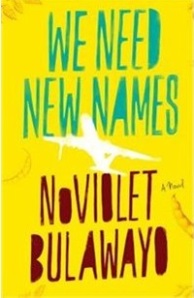We were on our way to Budapest: Bastard and Chipo and Godknows and Sbho and Stina and me. We are going even though we are not allowed to cross Mzilikazi Road, even though Bastard is supposed to be watching his little sister Fraction, even though Mother would kill me dead if she found out; we are just going. There are guavas to steal in Budapest, and right now I’d rather die for guavas. We didn’t eat this morning and my stomach feels like somebody just took a shovel and dug everything out.
The setting is present day Zimbabwe. The narrator is 10-year-old Darling — she and her running mates live in a shantytown but frequently head off to upper-class Budapest to steal guavas. They even have a rather sophisticated plan to “harvest” the fruit street by street, despite the fact that eating it so quickly leads to significant digestive problems. Food is food, after all.
 Child narrators are a convenient device for authors, particularly in troubled settings like Zimbabwe, and it is easy to understand why. The pre-teen point of view allows the author to abandon nuance and concentrate on a few major themes (poverty, oppression) as they are experienced by a maturing youth. The problem, of course, is the very loss of that nuance — unless the major themes are drawn so precisely and deliberately, they read like a statement of the obvious.
Child narrators are a convenient device for authors, particularly in troubled settings like Zimbabwe, and it is easy to understand why. The pre-teen point of view allows the author to abandon nuance and concentrate on a few major themes (poverty, oppression) as they are experienced by a maturing youth. The problem, of course, is the very loss of that nuance — unless the major themes are drawn so precisely and deliberately, they read like a statement of the obvious.
The opening paragraph supplies one example, so let’s try another. The gang is on their way back to Paradise, the shantytown where they live:
Going back to Paradise, we do not run. We just walk nicely like Budapest is now our country too, like we built it even, eating guavas along the way and spitting the peels all over to make the place dirty. We stop at the corner of AU Street for Chipo to vomit; it happens most of the time she eats. Today her vomit looks like urine, only thicker. We leave it there uncovered.
One day I will live here, in a house just like that, Sbho says, biting into a thick guava. She points to the big blue house with the long row of steps, flowers all around it. A really nice house, but not nicer than where we just got the guavas. Sbho’s voice sounds like she is not playing, like she knows what she is talking about. I watch her chew, her cheeks bulging. She swallows, starts to peel what is left of the guava with her side teeth.
How are you going to do that? I ask. Sbho spits the peels and says, with her big eyes, I just know it.
It is election time in Zimbabwe and that plays a role in the novel as well. The families of the gang are on the wrong side (non Mugabe, although he is never mentioned by name) — that is how they ended up in the shantytown in the first place. Needless to say, the election does not turn out well for them,
And there is also the Sickness. Darling’s father returns from working the mines in South Africa, literally a mere shadow of his former self due to the Sickness. He retreats to a cot and his inevitable death.
While those kinds of themes occupy the first half of the novel, Bulawayo expands her canvas in the second half by sending Darling to stay with an aunt in America (Destroyedmichygen is her port of entry):
With all the snow, with the sun not there, with the cold and the dreariness, this place doesn’t look like my America, doesn’t even look real. It’s like we are in a terrible story, like we’re in the crazy parts of the Bible, there where God is busy punishing people for their sins and is making them miserable with all the weather. The sky, for example, has stayed white all this time I have been here, which tells you that something is not right. Even the stones know that a sky is supposed to be blue, so blue you can spray Clorox on it and wipe it with a paper towel and it wouldn’t even come off.
The child narrator story becomes a coming-of-age one in America — unfortunately the events that take place there are every bit as predictable as the ones in Africa were.
In the final analysis, predictability is the problem that I had with We Need New Names. Bulawayo certainly has her charming moments, but they are only moments. Corrupt politics, AIDS, racism in American schools and other weighty issues arise in predictable fashion and receive a treatment that supplies no surprises or insight — the story simply moves on. Perhaps if I had been able to more deeply engage with Darling I would have found more in the book; for me she was pretty much a normal 10-year-old facing challenging circumstances.
Given their interest in unusual structures, as shown by the longlist, I have trouble fathoming how the Booker Jury came to move this one on to the shortlist. The novel features a completely conventional structure, the story has been told before — We Need New Names is a readable book, but not one that will live on in memory.

September 24, 2013 at 12:21 pm |
This one had zero appeal when I first saw it. The cover is not appealing in the least (not a deal killer) but then I steer away from child narrators.
LikeLike
September 24, 2013 at 1:57 pm |
I don’t think you would like this one at all.
LikeLike
September 24, 2013 at 4:30 pm |
Interesting, so interesting. Read this from Fast Reads shelf at library some months ago and think about it quite often. With some pleasure and have recommended it to my constant reader sister. For me , it was fresh and novel thematically. Goes to remind me that it’s a while between child narrators for me!!
Engrossed in The Luminaries, surprisingly.
LikeLike
September 24, 2013 at 7:11 pm |
I am certain that it has some appeal for some readers — glad to hear from someone who did like it.
LikeLike
September 24, 2013 at 6:00 pm |
Thank you, Kevin. You’ve confirmed that my reading time is best spent elsewhere.
On your Booker coverage, I am eager for Harvest, but have hermetically sealed myself off from your review after gathering you liked it quite a lot.
The Giller looks interesting too, though I was hoping to see Lahiri (also anticipating). I don’t know why as: I will read it; you will review it; she hardly needs more press. And yet.
LikeLike
September 24, 2013 at 7:12 pm |
I’m diving into Lahiri tomorrow — she isn’t eligible for the Giller so that is why you did not see The Lowland there.
LikeLike
September 24, 2013 at 7:37 pm |
I meant Catton. Doh. But I will look forward to your review of The Lowland. The Crace, Lahiri, and Catton are the three Booker contenders I am most interested in reading.
LikeLike
September 25, 2013 at 1:30 pm |
Well, it’s a fine review and I must say the book has not lingered. I enjoyed the read but it’s not a work that compares with The Lowland or particularly Harvest.
Interesting what you say about young narrators and nuance: there are always suggestions that such a young character is hard to accurately depict and embody but I think, in this case particularly, it does allow for gravitas to be earned with a minimum of elaboration and it’s a fair point.
LikeLike
September 25, 2013 at 1:33 pm |
My point would be that with young narrators observation is easy — the measure of success is whether fresh contemplation is added to the observation. Bulawayo does that on occasion here (more so in the American parts, I would say) but not often enough to give the novel weight.
LikeLike
September 26, 2013 at 5:00 am |
There is one scene in particular in the book that benefits from the approach Bulawayo adopts, when they witness the marauding gang of thugs delivering a pretty unequivocal notice of eviction to a white couple. I think that occasion, measured as it is through the eyes of those not really comprehending what’s happening or why, is both all the more powerful for it being seen through such a simplified prism and because of the potency lent to the scene in its aftermath as they survey the interior of the ransacked home. It’s the best scene in the book for me (alongside another scene involving an improvisation that portends to be grisly but thankfully turns out not to be) and both those scenes work primarily due to the viewpoint and characterisations. That they are so isolated is unfortunate.
LikeLike
September 26, 2013 at 8:20 am |
I do remember that scene and agree it worked well. For me, it perhaps suffered from a similar scene in The Hungry Ghosts. The point of view in Selvadurai’s novel, however, was a single young person — being “trained” in the ways of his property owning family.
LikeLike
September 26, 2013 at 7:18 am |
The story of this novel does sound all too familiar, predictable as you say.
LikeLike
October 2, 2013 at 9:29 am |
Hm, well, thank you Kevin. This one might well have tempted me, but now doesn’t. Always appreciated given the length of my to be read pile.
I do have a pet hate of books that put developing world issues in perspective by moving the character at some point to the US. It’s lazy and banal, and I’ve seen it far too often to want to see it more. I suspect it’s often because the writers in question are essentially American writers, but with a family connection to somewhere else which can be used in their fiction.
NoViolet Bulawayo grew up in Zimbabwe, but I note did her degree in the US and now teaches there. Expat fiction has become a sort of (particularly US) genre, and not for me an interesting one.
LikeLike
October 2, 2013 at 9:45 am |
I am keener on expat fiction than you are, although I do agree there are some weak examples (and I would put this one in that category). Significantly, I think the best examples (Rohinton Mistry comes immediately to mind) do not choose to include the American experience in their novels. The story of how America is not really what it was cracked up to be is rather tired for certain.
I also quite like what I call “second-generation expat” fiction where the author has obviously listened carefully to the stories of his or her parents (who were too busy establishing themselves to consider writing about the experience) and found a way to capture both old home and new home. Jhumpa Lahiri is an excellent example of that for me — I’ll soon be getting to her new novel, The Lowland, which is on the Booker shortlist.
LikeLike